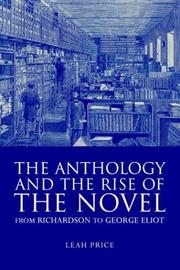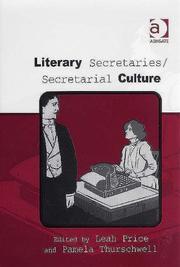| Listing 1 - 9 of 9 |
Sort by
|
Book
ISBN: 9780300170924 Year: 2011 Publisher: New Haven, Conn. Yale University Press
Abstract | Keywords | Export | Availability | Bookmark
 Loading...
Loading...Choose an application
- Reference Manager
- EndNote
- RefWorks (Direct export to RefWorks)
Book
ISBN: 1280494182 9786613589415 1400842182 069111417X 0691159548 9781400842186 9780691114170 9781280494185 9780691159546 Year: 2012 Publisher: Princeton Princeton university press
Abstract | Keywords | Export | Availability | Bookmark
 Loading...
Loading...Choose an application
- Reference Manager
- EndNote
- RefWorks (Direct export to RefWorks)
How to Do Things with Books in Victorian Britain asks how our culture came to frown on using books for any purpose other than reading. When did the coffee-table book become an object of scorn? Why did law courts forbid witnesses to kiss the Bible? What made Victorian cartoonists mock commuters who hid behind the newspaper, ladies who matched their books' binding to their dress, and servants who reduced newspapers to fish 'n' chips wrap? Shedding new light on novels by Thackeray, Dickens, the Brontës, Trollope, and Collins, as well as the urban sociology of Henry Mayhew, Leah Price also uncovers the lives and afterlives of anonymous religious tracts and household manuals. From knickknacks to wastepaper, books mattered to the Victorians in ways that cannot be explained by their printed content alone. And whether displayed, defaced, exchanged, or discarded, printed matter participated, and still participates, in a range of transactions that stretches far beyond reading. Supplementing close readings with a sensitive reconstruction of how Victorians thought and felt about books, Price offers a new model for integrating literary theory with cultural history. How to Do Things with Books in Victorian Britain reshapes our understanding of the interplay between words and objects in the nineteenth century and beyond.
Books and reading --- Books --- Book industries and trade --- English fiction --- Books and reading in literature. --- Books in literature. --- Book trade --- History --- Psychological aspects --- Social aspects --- History and criticism. --- Great Britain --- Library materials --- Publications --- Bibliography --- Cataloging --- International Standard Book Numbers --- Cultural industries --- Manufacturing industries --- Books and reading in literature --- Books in literature --- History and criticism --- Anthony Trollope. --- David Copperfield. --- Enlightenment. --- Evangelical publishers. --- George Gissing. --- Henry Mayhew. --- Victorians. --- antisocial genre. --- authors. --- bildungsroman. --- book buying. --- book handling. --- book preservation. --- book selling. --- book transactions. --- books. --- circulation. --- coffee-table book. --- cultural history. --- electronic media. --- household manual. --- identity. --- junk mail. --- life writing. --- literary criticism. --- literary theory. --- metonymy. --- mid-Victorian novels. --- newspaper. --- niche marketing. --- novel. --- novels. --- paper recycling. --- paper taxes. --- plastics. --- printed matter. --- reader response. --- readerly rule. --- readers. --- reading. --- religious tracts. --- scholars. --- secular fiction. --- secular novelists. --- secular press. --- self-help. --- selfhood. --- shared reading. --- social entanglements. --- text. --- tract distribution. --- unread book. --- urban sociology. --- verbal content. --- wood-pulp paper. --- writing. --- Book history --- Psychological study of literature --- anno 1800-1899
Book
ISBN: 1280571489 9786613601087 0300180586 9780300180589 9780300170924 0300170920 Year: 2011 Publisher: New Haven [Conn.] Yale University Press
Abstract | Keywords | Export | Availability | Bookmark
 Loading...
Loading...Choose an application
- Reference Manager
- EndNote
- RefWorks (Direct export to RefWorks)
As words and stories are increasingly disseminated through digital means, the significance of the book as object-whether pristine collectible or battered relic-is growing as well. Unpacking My Library: Writers and Their Books spotlights the personal libraries of thirteen favorite novelists who share their collections with readers. Stunning photographs provide full views of the libraries and close-ups of individual volumes: first editions, worn textbooks, pristine hardcovers, and childhood companions. In her introduction, Leah Price muses on the history and future of the bookshelf, asking what books can tell us about their owners and what readers can tell us about their collections. Supplementing the photographs are Price's interviews with each author, which probe the relation of writing to reading, collecting, and arranging books. Each writer provides a list of top ten favorite titles, offering unique personal histories along with suggestions for every bibliophile. Unpacking My Library: Writers and Their Books features the personal libraries of Alison Bechdel, Stephen Carter, Junot Díaz, Rebecca Goldstein and Steven Pinker, Lev Grossman and Sophie Gee, Jonathan Lethem, Claire Messud and James Wood, Philip Pullman, Gary Shteyngart, and Edmund White.
Authors --- Authors, American --- American authors --- Books and reading.
Book
ISBN: 9780465042685 9781541673908 0465042686 Year: 2019 Publisher: New York, N.Y. Basic Books
Abstract | Keywords | Export | Availability | Bookmark
 Loading...
Loading...Choose an application
- Reference Manager
- EndNote
- RefWorks (Direct export to RefWorks)
In encounters with librarians, booksellers, and activists who are reinventing old ways of reading, Price offers fresh hope to bibliophiles and literature lovers alike.
Book history --- Sociology of literature --- 09 <08> --- 09 <08> Handschriften. Oude en merkwaardige drukken. Curiosa--Verzamelwerken. Reeksen--Boekwetenschap. Sociale aspecten van het boek. Boek en media. Toekomst van het boek --- Handschriften. Oude en merkwaardige drukken. Curiosa--Verzamelwerken. Reeksen--Boekwetenschap. Sociale aspecten van het boek. Boek en media. Toekomst van het boek

ISBN: 9780511484445 9780521782081 9780521539395 0511013248 9780511013249 0521782082 0511030924 9780511030925 0511118724 9780511118722 0521539390 0511484445 9780511046179 0511046170 0511153856 9780511153853 1280159162 9781280159169 1107120551 9781107120556 0511328095 9780511328091 Year: 2000 Publisher: Cambridge [England] New York Cambridge University Press
Abstract | Keywords | Export | Availability | Bookmark
 Loading...
Loading...Choose an application
- Reference Manager
- EndNote
- RefWorks (Direct export to RefWorks)
The Anthology and the Rise of the Novel, first published in 2000, brings together two traditionally antagonistic fields, book history and narrative theory, to challenge established theories of 'the rise of the novel'. Leah Price shows that far from leveling class or gender distinctions, as has long been claimed, the novel has consistently located them within its own audience. Shedding new light on Richardson and Radcliffe, Scott and George Eliot, this book asks why the epistolary novel disappeared, how the book review emerged, why eighteenth-century abridgers designed their books for women while Victorian publishers marketed them to men, and how editors' reproduction of old texts has shaped authors' production of new ones. This innovative study will change the way we think not just about the history of reading, but about the genealogy of the canon wars, the future of intellectual property, and the role that anthologies play in our own classrooms.
820-3 "17/19" --- English fiction --- -English fiction --- -Literary form --- -Anthologies --- Editing --- English literature --- Form, Literary --- Forms, Literary --- Forms of literature --- Genre (Literature) --- Genre, Literary --- Genres, Literary --- Genres of literature --- Literary forms --- Literary genetics --- Literary genres --- Literary types (Genres) --- Literature --- 820-3 "17/19" Engelse literatuur: proza--?"17/19" --- Engelse literatuur: proza--?"17/19" --- History and criticism --- History --- -History --- -Editing --- Richardson, Samuel --- -Eliot, George --- Richardson, S. --- Cross, Marian Evans, --- Evans, Marian, --- Eliot, Džordž, --- Ėliot, Dzhordzh, --- Cross, Mary Ann, --- Lewes, M. E. --- Lewes, Marian Evans, --- Elliŏtʻū, Choji, --- Eliyaṭ, Jārj, --- Evans, Mary Anne, --- אליוט, ג׳ַַורג׳ --- אליוט, ג׳ורג׳, --- עליאט, דזשארדזש --- עליאט, דזשארדזש, --- עליוט ג׳יארג׳, --- עליוט, גי׳ארג׳, --- עליוט, ג׳רארג׳, --- Criticism and interpretation --- Criticism and interpretation. --- Anthologies --- Literary form. --- Chrestomathies --- Collected papers (Anthologies) --- Collections (Anthologies) --- Papers, Collected (Anthologies) --- Readings (Anthologies) --- History and criticism. --- History. --- Richardson, Samuel, --- Eliot, George, --- Literary form --- Editing. --- Arts and Humanities --- 18th century --- 19th century --- Eliot, George --- Richardson, Samuel, - 1689-1761 - Criticism and interpretation. --- Eliot, George, - 1819-1880 - Criticism and interpretation. --- Anthologies - History and criticism.
Digital
ISBN: 9781400842186 9780691114170 Year: 2012 Publisher: Princeton, N.J. Princeton University Press
Abstract | Keywords | Export | Availability | Bookmark
 Loading...
Loading...Choose an application
- Reference Manager
- EndNote
- RefWorks (Direct export to RefWorks)
Book
ISBN: 9780198809791 0198809794 Year: 2020 Publisher: Oxford, United Kingdom Oxford University Press
Abstract | Keywords | Export | Availability | Bookmark
 Loading...
Loading...Choose an application
- Reference Manager
- EndNote
- RefWorks (Direct export to RefWorks)
What does reading mean in the twenty-first century? As other disciplines challenge literary criticism's authority to answer this question, English professors are defining new alternatives to close reading and to interpretation more generally. Further Reading brings together thirty essays drawing on approaches as different as formalism, historicism, neuroscience, disability, and computation. Contributors take up the following questions: What do we mean when we talk about 'reading' today? How are reading techniques evolving in the digital era? What is the future of reading? This book foregrounds reading as a topic worthy of investigation in its own right rather than as a sub-section of histories of the book, sociologies of literacy, or theories of literature. As our knowledge of reading changes in step with the media and the scholarly tools used to apprehend it, a more precise understanding of this topic is crucial to the discipline's future. This collection introduces new ways of conceptualizing the term's forms, boundaries, and uses. Its contributors bring varied vocabularies to bear on the contested nature and continued importance of reading, within the academy and beyond.
Books and reading. --- Livres et lecture --- Books and reading --- Appraisal of books --- Books --- Choice of books --- Evaluation of literature --- Literature --- Reading, Choice of --- Reading and books --- Reading habits --- Reading public --- Reading --- Reading interests --- Reading promotion --- Appraisal --- Evaluation

Abstract | Keywords | Export | Availability | Bookmark
 Loading...
Loading...Choose an application
- Reference Manager
- EndNote
- RefWorks (Direct export to RefWorks)
Secretaries in literature --- Writing in literature --- Women in literature
Digital

ISBN: 9780231553681 Year: 2021 Publisher: New York, N.Y. Columbia University Press
Abstract | Keywords | Export | Availability | Bookmark
 Loading...
Loading...Choose an application
- Reference Manager
- EndNote
- RefWorks (Direct export to RefWorks)
| Listing 1 - 9 of 9 |
Sort by
|

 Search
Search Feedback
Feedback About UniCat
About UniCat  Help
Help News
News